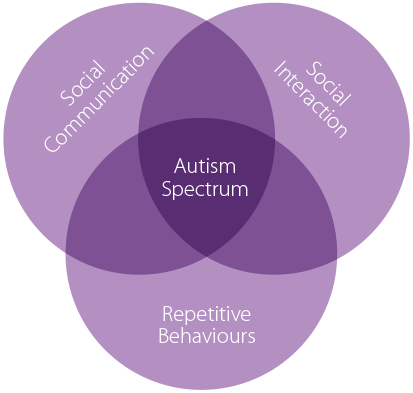How to explain autism to your family and friends
Awareness of autism is growing, with greater representation in our culture thanks to public figures like Chris Packham, Dan Ackroyd and Susan Boyle speaking about their own experiences. But there is still a long way to go. For many, the mental picture of an autistic person hasn’t progressed since Dustin Hoffman’s memorable performance in the movie Rain Man. So when confronted with the knowledge that a child they know and love has been diagnosed with autistic spectrum disorder (ASD), responses can vary from panic to total denial. What can you do as the parent of an autistic child to break down these barriers and help those around your child support and accept their diagnosis?
Spectrum

The concept of an autistic spectrum is becoming much more widely known, but not necessarily always understood. Unhelpfully, the assertion that a person is ‘on the spectrum’ is often used as shorthand for describing any sort of awkward or unusual character traits. The effect may be to create a further negative impression of what it means to be autistic. Sometimes it can help those around you and your child if you start by explaining what the spectrum actually is and where your child fits into it.
This is a big subject and you might not have much time to get your points across, so start with the basics. Let people know about the behaviours associated with autism and explain that they are divided into two groups:
Children with different social skills. People close to your child may have already noticed that they don’t respond to greetings or behave in the expected way in social situations. This can manifest itself through speech or with nonverbal communication, most commonly avoiding eye contact or facial expressions.
Restricted or repetitive behaviours and interests. Autistic children often have intense fascination with a single thing (and it could be almost anything) or may want to stick to set routines and rituals around food, for example, or taking the same route to school. Explain that this is not to be avoided or corrected - not only is it a normal part of their ASD, it’s a way for them to regulate their world and feel more secure.

Acceptance of these behaviours can go a long way to helping your child. The more people understand them the more they will feel in control and able to help your child.
Resistance
It’s a natural and common response to ask whether anything has caused their autism. There is much misinformation out there, from fears about vaccinations to the idea that autism is caused by ‘bad’ parenting. The best way to dispel these myths is to stick to the science. Explain that this is a proven genetic condition that begins in utero. Autism is a neurodevelopmental difference in their DNA, so it’s not something they’re going to ‘grow out of’.
Another common reaction is to resist the diagnosis altogether and seek alternative explanations. This is based in fear, for your child, your family and for them. It’s natural to want to fight something that can be perceived as a negative. In this case, explain that there is no cure, and if there were, it would mean completely rewiring the brain, effectively turning them into a different person. It is not only unrealistic, it is potentially harmful to the child to expend energy on trying to change who they are.

Acceptance
The sooner the people closest to your child come to terms with their diagnosis the better. Many people believe autism is a negative label that will harm a person’s life chances. In fact the opposite is true, understanding autism and not hiding it, particularly in their formative years can help your child understand who they are and enable them to focus on their strengths as they grow older. Ultimately what everyone who loves your child really wants is for them to be healthy and happy – their acceptance of this diagnosis will go a long way to making this a possibility.
Having a diagnosis also means that your family will be eligible for support at school along with therapies and services that can be transformative.
